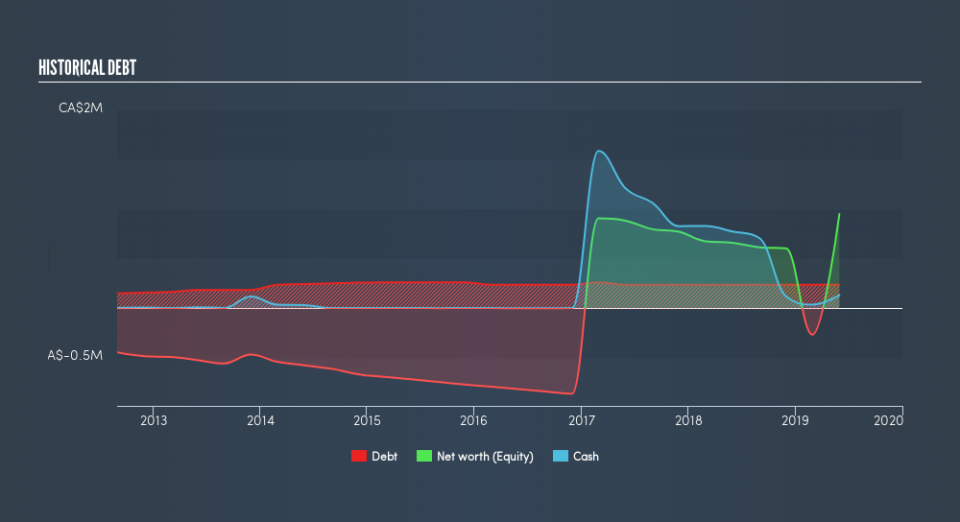We Think Vinergy Cannabis Capital (CNSX:VIN) Has A Fair Chunk Of Debt

David Iben put it well when he said, 'Volatility is not a risk we care about. What we care about is avoiding the permanent loss of capital.' When we think about how risky a company is, we always like to look at its use of debt, since debt overload can lead to ruin. As with many other companies Vinergy Cannabis Capital Inc. (CNSX:VIN) makes use of debt. But the real question is whether this debt is making the company risky.
When Is Debt Dangerous?
Generally speaking, debt only becomes a real problem when a company can't easily pay it off, either by raising capital or with its own cash flow. Part and parcel of capitalism is the process of 'creative destruction' where failed businesses are mercilessly liquidated by their bankers. While that is not too common, we often do see indebted companies permanently diluting shareholders because lenders force them to raise capital at a distressed price. By replacing dilution, though, debt can be an extremely good tool for businesses that need capital to invest in growth at high rates of return. The first thing to do when considering how much debt a business uses is to look at its cash and debt together.
View our latest analysis for Vinergy Cannabis Capital
What Is Vinergy Cannabis Capital's Debt?
The chart below, which you can click on for greater detail, shows that Vinergy Cannabis Capital had CA$235.0k in debt in May 2019; about the same as the year before. However, it does have CA$131.2k in cash offsetting this, leading to net debt of about CA$103.8k.
How Healthy Is Vinergy Cannabis Capital's Balance Sheet?
Zooming in on the latest balance sheet data, we can see that Vinergy Cannabis Capital had liabilities of CA$1.15m due within 12 months and no liabilities due beyond that. On the other hand, it had cash of CA$131.2k and CA$1.96m worth of receivables due within a year. So it can boast CA$933.6k more liquid assets than total liabilities.
This surplus suggests that Vinergy Cannabis Capital has a conservative balance sheet, and could probably eliminate its debt without much difficulty. But either way, Vinergy Cannabis Capital has virtually no net debt, so it's fair to say it does not have a heavy debt load! There's no doubt that we learn most about debt from the balance sheet. But you can't view debt in total isolation; since Vinergy Cannabis Capital will need earnings to service that debt. So when considering debt, it's definitely worth looking at the earnings trend. Click here for an interactive snapshot.
Since Vinergy Cannabis Capital doesn't have significant operating revenue, shareholders must hope it'll sell some fossil fuels, before it runs out of money.
Caveat Emptor
Over the last twelve months Vinergy Cannabis Capital produced an earnings before interest and tax (EBIT) loss. To be specific the EBIT loss came in at CA$116k. On a more positive note, the company does have liquid assets, so it has a bit of time to improve its operations before the debt becomes an acute problem. Still, we'd be more encouraged to study the business in depth if it already had some free cash flow. This one is a bit too risky for our liking. For riskier companies like Vinergy Cannabis Capital I always like to keep an eye on the long term profit and revenue trends. Fortunately, you can click to see our interactive graph of its profit, revenue, and operating cashflow.
If you're interested in investing in businesses that can grow profits without the burden of debt, then check out this free list of growing businesses that have net cash on the balance sheet.
We aim to bring you long-term focused research analysis driven by fundamental data. Note that our analysis may not factor in the latest price-sensitive company announcements or qualitative material.
If you spot an error that warrants correction, please contact the editor at editorial-team@simplywallst.com. This article by Simply Wall St is general in nature. It does not constitute a recommendation to buy or sell any stock, and does not take account of your objectives, or your financial situation. Simply Wall St has no position in the stocks mentioned. Thank you for reading.


